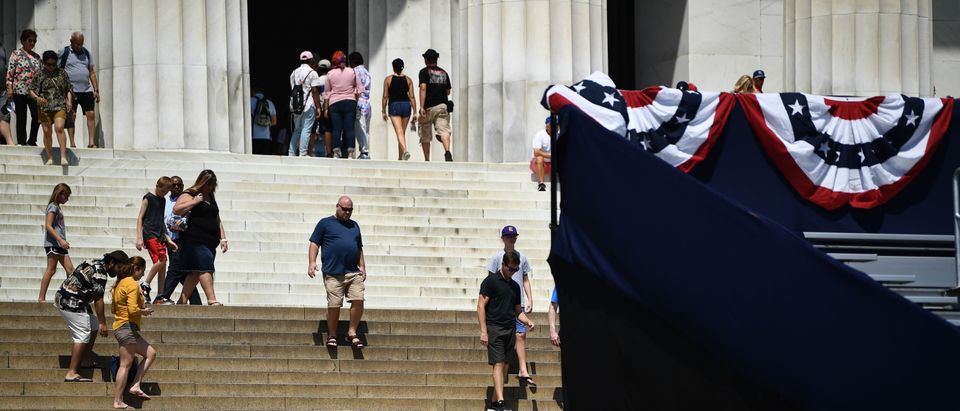While President Trump leads today’s Republican party, his unusual personality and management style are unlikely to leave a lasting impact on the GOP’s DNA. His intentionally disruptive presidency will undoubtedly affect our major alliances plus global trade and investment practices for a few years.
The Trump presidency, however, is so keyed to the dynamic swings of this president’s mercurial moods that any lasting effect will likely be minimal. Hurricanes come and go; rebuilding inevitably follows. After Trump, the GOP’s direction will be up for grabs.
Trump will survive a Senate impeachment trial. Given current polling, his reelection prospects remain uncertain, but even if he is reelected next year, it’s worth considering today how the GOP brand will evolve post-Trump. Whatever his accomplishments, his style will not last.
Trump’s Democratic and media critics believe that he has done lasting damage to future Republican prospects, but the GOP rebounded quickly six years after Nixon’s Watergate debacle. As Marcel Proust might counsel, to anticipate the future, it’s helpful to understand the past.
Trump’s three immediate GOP predecessors offered mainstream GOP branding and messaging. The past never repeats itself exactly, but it often leaves influential and lasting traces. How might these previous GOP leaders shape the party’s future?
Like Trump, Ronald Reagan positioned himself as an outsider, but Reagan was not an unpredictable disrupter. He focused on rebuilding the country after Jimmy Carter’s rampant inflation, high interest rates, and failed Iranian hostage-rescue attempt. Reagan also appointed the first woman Supreme Court associate justice.
You can summarize Reagan’s agenda in six words: less government, lower taxes, stronger defense. That message still resonates. Reagan’s reelection campaign also stressed sunny optimism: the economic growth, renewal, and resurgence associated with “Morning in America.”
George H.W. Bush campaigned as an “education president” whose “1,000 points of light” message promised a “kinder, gentler” version of Reaganism without alienating Reagan’s base. When he reversed his “no new taxes” pledge and endorsed a tax increase, he lost Reagan’s base. When a relatively brief and shallow recession began, even his Persian Gulf War victory wasn’t enough to prevent losing to an inexperienced Arkansas governor. Today, it’s perhaps forgotten that George H.W. Bush signed legislation increasing family-based and skill-based visas.
George W. Bush stressed “compassionate conservatism” and hoped to employ his Spanish fluency to woo Hispanic voters. He won 44 percent of Latino voters in 2004. (John McCain won 31 percent in 2008; Mitt Romney won 27 percent in 2012; and Donald Trump won 28 percent in 2016). Bush’s bipartisan “No Child Left Behind” education legislation was well-intentioned but easily gamed: it failed to deliver the promised reforms. Much of his presidential legacy will be tied to his Middle East decisions and diplomacy.
These precedents provide a context, a pentimento, that will shape the party’s future. The United Kingdom’s former Labour Party Prime Minister Tony Blair, for example, chose not to repudiate his Conservative predecessor Margaret Thatcher. Instead, Blair built upon her successes and added his own unique approaches that softened many of Thatcher’s harder edges.
Trump’s GOP successors will encounter a markedly different world from that of Reagan and both Bushes. Globalization, immigration, nationalism, demographics, terrorism, and the economy will all pose challenges. Trump’s GOP successor must be “kinder, gentler” and must devise new domestic policies that appeal to broader constituencies than Trump’s current base.
If it wants to remain the majority, governing party, the GOP cannot afford to keep alienating white suburban women, minorities, and legal immigrants. Trump’s political base will not guarantee future electoral-college victories; the next GOP leader must broaden that base by appealing to groups that Trump has alienated.
Trump’s successor should project Reagan’s optimism, H.W. Bush’s “kinder, gentler” style, and W. Bush’s “compassionate conservatism” (a take on the late Jack Kemp’s “bleeding heart conservatism”). If the next GOP leader couples this stylistic approach with a focus on shared and sustained economic growth, legal immigration, strong international alliances, global competitiveness, and a muscular military defense (including support for human rights, democratic institutions, cybersecurity, anti-terrorism policies, and containing so-called rogue nations), the Democrats will be left with little more than identity politics and proposing higher spending programs.
Trump’s successor will also have to address years of unsustainable monetary and fiscal policies, while simultaneously championing carefully conceived infrastructure investments that create real jobs.
Americans are optimistic, pragmatic, tough-minded, and generous. If the GOP can devise the right policy prescriptions for America’s future, then all that’s needed is the right leader.
Charles Kolb was deputy assistant to the president for domestic policy in the George H.W. Bush White House from 1990-1992. From 1997-2012, he was president of the nonpartisan, business-led think tank, the Committee for Economic Development.
The views and opinions expressed in this commentary are those of the author and do not reflect the official position of The Daily Caller.


